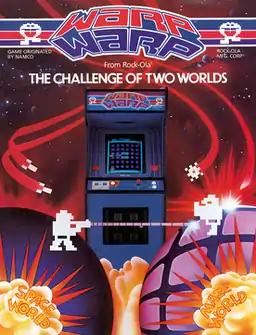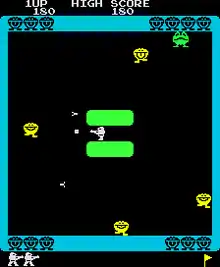Warp & Warp
Warp & Warp (ワープ & ワープ, Wāpu to Wāpu) is a multidirectional shooter arcade game that was released by Namco in 1981 and licensed to the Rock-Ola Manufacturing Corporation for US manufacture and distribution as Warp Warp. The game was later ported to the Sord M5 and the MSX. A sequel game, titled Warpman, was released in 1985 for the Family Computer, and featured additional enemy types, powerups and improved graphics and sound.
| Warp & Warp | |
|---|---|
 North American arcade flyer | |
| Developer(s) | Namco |
| Publisher(s) | |
| Designer(s) | Shinichirou Okamoto[1] Shigeichi Ishimura |
| Programmer(s) | Shouichi Fukatani[1] |
| Series | Warp & Warp |
| Platform(s) | Arcade, MSX, Sord M5, PV-1000 |
| Release | |
| Genre(s) | Multidirectional shooter |
| Mode(s) | Single player, multiplayer |
| Arcade system | Namco Warp & Warp |
Gameplay

The player must take control of a "Monster Fighter", who must shoot tongue-sticking aliens named "Berobero" (a Japanese onomatopoeic word for licking) in the "Space World" without letting them touch him. If he kills three Berobero of the same colour in a row, a mysterious alien will appear that can be killed for extra points. When the Warp Zone in the centre of the screen flashes (with the Katakana text ワープ (Wāpu) in the Japanese version or the English text "WARP" in the US versions), it is possible for the Monster Fighter to warp to the "Maze World", where the Berobero must be killed with time-delay bombs. The delay is controlled by how long the player holds the button down - but every time he kills one, his bombs will get stronger, making it easier for the Monster Fighter to blow himself up with his own bombs until he returns to Space World.
Reception
AllGame compared its gameplay to Wizard of Wor and Bomberman, describing it as "an obscure but endearing maze shooter".[2]
References
- Szczepaniak, John (11 August 2014). The Untold History of Japanese Game Developers (First ed.). p. 201. ISBN 978-0992926007. Retrieved 12 August 2019.
- Brett Alan Weiss (1998). "Warp Warp - Review". AllGame. All Media Network. Archived from the original on November 16, 2014. Retrieved September 4, 2020.